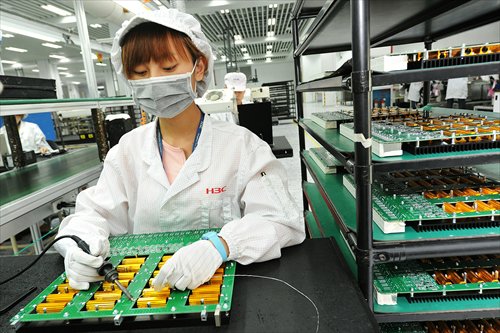Tsinghua Unigroup buys HP unit stake
Obtains part of new data networking entity for $2.3b

Employees work on server boards in H3C Technologies Co's factory in Hangzhou, East China's Zhejiang Province. Photo: CFP
Unisplendour Corporation, the listed arm of Tsinghua Holdings, announced late on Thursday its purchase of a majority stake in Hewlett-Packard Co (HP)'s data networking business in China.
Unisplendour Corp will purchase a 51 percent stake "in a new business called H3C, comprising H3C Technologies and HP's China-based server, storage and technology services businesses, for approximately $2.3 billion, valuing the total business at $4.5 billion," according to a joint statement released on late Thursday.
The deal is expected to close near the end of the year, "subject to Unisplendour shareholder vote, regulatory approvals and other closing conditions," said the statement.
The two sides will hold a news conference in Beijing on Friday to reveal more details about the deal, a source familiar with the matter told the Global Times on Thursday.
Unisplendour Corp, the listed arm of Tsinghua Holdings, halted trading since May 14 on the Shenzhen Stock Exchange, pending important information disclosure.
Analysts attributed HP's majority stake sales to headwinds facing Western companies in China after Edward Snowden's disclosure of cyber spying involving US tech companies in 2013.
"Overseas technology companies are struggling for consumers, as Chinese authorities have called for less dependence on foreign networking gear over national security concerns," Xiang Ligang, CEO of telecom information portal cctime.com, told the Global Times Thursday.
HP is not the only one seeking Chinese counterparts to help reach consumers in China.
Intel Corp in September 2014 announced on its website that it had agreed to invest up to 9 billion yuan ($1.45 billion) for a 20 percent stake in the semiconductor business under Tsinghua Unigroup, whose parent company is Tsinghua Holdings.
In October 2014, French telecommunications equipment company Alcatel-Lucent closed the sale of 85 percent of its enterprise computing subsidiary to State-run China Huaxin Post and Telecommunication Economy Development Center, according to a joint press release.
With State-backed companies as its partner, foreign tech enterprises such as HP will likely continue getting their slice of Chinese government contracts, said Xiang.
"In the past, the R&D, manufacturing and marketing of H3C are in China, but they had a foreign parent company," Xiang said.
This caused challenges for H3C for implementing large networking equipment projects, especially those driven by the Chinese government," Steven Hu, research manager of IDC networking research, said in a statement e-mailed to the Global Times on late Thursday.
When this deal is done, "H3C will become a local vendor and will pose a serious threat to Huawei and Cisco, significantly heating up the competition," Hu believes.
The stake sale also indicates that HP, which has been struggling to remake its businesses in China, has failed to succeed in integrating the assets of H3C Technologies, Fu Liang, a Beijing-based independent IT analyst, told the Global Times on Thursday.
H3C was established in 2003 as a joint venture between US computer network infrastructure company 3Com Corp and Huawei Technologies Co and inherited by HP in 2010 via a purchase of 3Com.
As for the Chinese side, the deal officially announced on late Thursday is also regarded as a good bargain by some analysts.
With 5,000 employees worldwide, Hangzhou-based H3C is now a major networking gear supplier in China.
By the end of 2014, the company owned 2,800 authorized patents, among which 2,300 were patents of invention, according to a statement issued by Zhejiang Provincial Intellectual Property Office in March.
The H3C purchase may also help strengthen Tsinghua Unigroup's competition in the handset chip manufacturing industry globally, said Xiang.
"In comparison with overseas brands, domestically designed mobile phone chips are lagging far behind in terms of technology and mainly adopted by lesser-known middle- and low-end smartphones," he noted.
Tsinghua Unigroup acquired Shanghai-based Spreadtrum Communications Inc and another Shanghai semiconductor maker RDA Microelectronics in December 2013 and July 2014 respectively to further its presence in the country's mobile chip industry, which analysts said is mainly controlled by US-based mobile chip giant Qualcomm Inc.